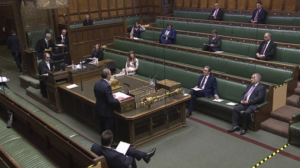It is not a secret that Count Johnson has been using services of various cunning advisers who stand behind his policies. It has now come to view that the source of proposed “herd immunity” policy, to which I referred in my LRO text of 17 March, originates from a controversial figure of Dominic Cumming. He is not only Premier’s alter ego and chief adviser, but also chief architect of Vote Leave Campaign, known as Brexit, who promised to reorganise British civil service in accordance with new selection criteria for servants as “weirdoes and misfits” he would himself police. Last month, for example, he recruited Mr Andrew Sabiski who, as it quickly emerged, had been transmitting views that black people have lower IQ than white people, and recommended introduction of contraceptive control for the purpose of preventing to create a permanent underclass. These racist views led to Mr Sabiski being sacked before he got used to the new post.
Does this explain or at least shed new light on specific character of the function of law in the UK as all regulating and all-organising where liberalism enjoys being both its beneficiary and a stranger? It is not by accident that in the face of the viral plague that we fear as creeping in from every social corner to the uncertainty each moment brings, the policy adopted by the Count is that of delay in the name of liberalism taking on a form of advice and recommendation: “please, please stay at home, don’t think that fresh air is some immunity”, as he said again on Sunday, 23 March. Everyone is now speaking about Britain’s exceptional position which is not without an exceptional standpoint taken by an adviser who carries, apparently, the brightest torch of democracy. It has now come to light, by no gossip-spreading rag but by Sunday Times (23 March), that the “herd immunity” policy that passed briefly through blue-print stage, was in fact designed by Mr Cumming. He was allegedly overheard as advocating it, adding “and if some pensioners die, it’s too bad”. The government vehemently denied it, which has not deflected us from being confronted with a desire at work that is not any desire but a masochist one. There is the real we fear as a community confronted with invisible invasion of headless army, and cling to daily statistics, and there is a real mobilised by missing knowledge and absent signifier to assuage anxiety, or as E. Laurent beautifully put it, to disanguish it. This is how Lacan read Freud’s distinction between fear and anxiety. Lacan refined this difference by adding that there is no anxiety without the real.

The current policy of delay, and social sensitivity teased by it, is one of the effects of how the real of anxiety is, or not, recognised. The striking reluctance to abandon democratic liberties as an alternative to imposition of prohibitive law amounts to keeping the law at a distance, so that to support jouissance of anything goes, i.e. or of a well-intentioned advice, that in turn keeps the phallic value of economy rolling. There is another way to enjoy one’s satisfactions than by transgressing the law that for this reason is not imposed. When Lacan spoke about desire in its transgressive function in relation to the law (Sem. XI), he also spoke about desire as mobilised by a lack. This was of importance to him when he took up man’s position in sexuation. In the end Lacan concluded that lack is an entirely man’s affair.
The only policy that in effect British PM has come up with and pursued to-date is that of “social distancing”. It’s indeed a weird formulation, and the exact opposite to the animation in the medial, social connections and transmission of which LRO community is the very testimony! Human, speaking beings, and women in particular and in the singular, are not cut for “social distancing”. Why not simply have a ban on public gatherings, a law with which we are all familiar? The other term, “self-isolation” (“self” to suggest that you and I want it), seems even stranger but is not out of place as its reminds us of banishment and its corollary of deportation and removal policies that keep the sense of racism, as exclusion of heteros, alive. Let’s see where this formulation takes us. On the one hand, “social distancing” translates into distance from law’s prohibitive function that dominates British political and historical scene. On the other hand, the politics of libertarian recommendation as measure of protection against spread of virus speaks of distance, and isolation as man would, from law’s constitutive function of desire in relation to anxiety. What Mr Johnson adheres to in his handling of the current situation is the advice transmitted to him père-versely by advisors and followed as such. Banalisation of the real in this sense in politics today consists in a push to degrade the real, as extimate to desire, from the singular economy of jouissance of a speaking, anguished body. We are confronted with banality of the real for which the only responsibility appears to be that of denial and delay by a man and his polymorphic solutions.







